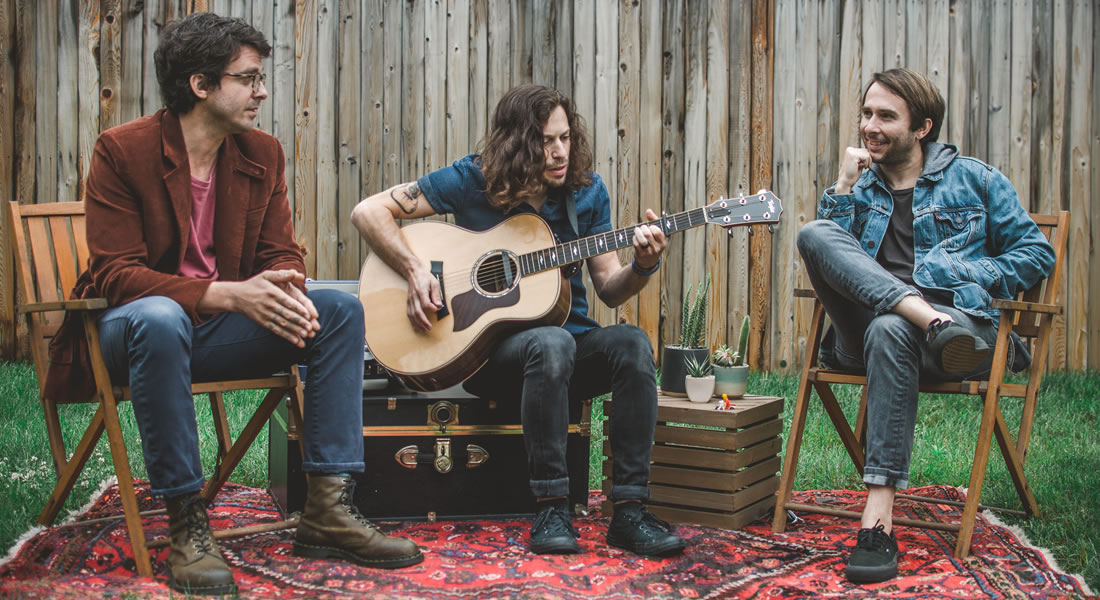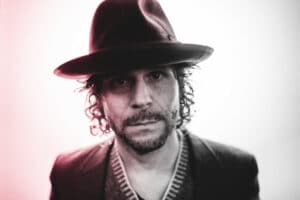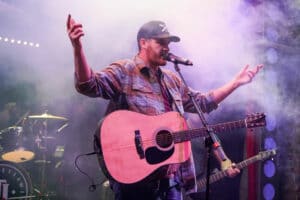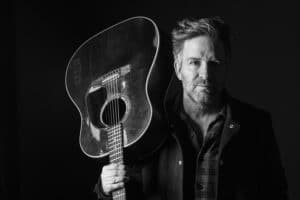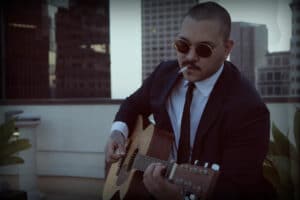Good Old War’s Tim Arnold: ‘It took … the truth to get me back in’
Good Old War's Tim Arnold: 'It took ... the truth to get me back in'

The thought of giving up everything, however, wasn’t on his radar, he told The Ties That Bind Us recently. Waking up every day and having to get high just to feel some semblance of normality — that had to stop, he thought. But the rest of it?
“I went to treatment thinking I was still going to drink,” he said with a laugh. “I went in thinking, ‘Cool; I’ll get clean, because I could lose my family, my child, but I’ll come out and just drink beer.’ But then I got to treatment, and they were reading in the Big Book these examples of an alcoholic, and I was like, ‘Oh, wow — every single one of these is me!’
“It took me a minute to realize that, but when I did, it hit me like a ton of bricks. It took me going to treatment to learn about alcoholism and learn that I had real problems. I was at a point where I only drank a six pack a night — that was it, but if I didn’t have that six pack a night, I was awful. It took me until I went to treatment to understand my dependence on alcohol and to understand how bad it was. With the dope, I was smoking heroin all the time, and I wasn’t stupid. I knew that was wrong. But when it hit me about drinking, I made the decision then and there.”
The War begins
It was a long and arduous climb out of the abyss for Arnold to become human again, and even more work to get back into the band he helped start back in 2008. Today, the old friends who make up Good Old War are closer than they’ve ever been, or at least since the group’s early days, before Arnold’s addiction began to rob him of everything he had.

Inspired by the immediacy of their friendship, the three then decided to start Good Old War, which began as a casual cover band in Philadelphia-area bars. Fans couldn’t help but notice the chemistry when the three combined their vocals, however; an Everly Brothers song with three-part harmonies sounded exquisite, and the audience response was enthusiastic. As Good Old War, the guys released “Only Way to Be Alone” in 2008, following it up with a 2010 self-titled album and a 2012 breakthrough, “Come Back As Rain.” A couple of years later, however, the relationship between the three men began to unravel.
“It was a long time coming; at first, it was, ‘You’re not allowed to do drugs on tour anymore,’ and I was like, ‘Fine,’ so I basically would hide what I was doing,” he said. “Then it was, ‘OK, no more whiskey on tour anymore,’ and I was like, ‘Fine,’ but then I’d drink half a case of beer a night. I knew I was an addict while I was doing it, and it gave me anxiety, and I always knew in the back of my mind that I had to stop. I did every time we would go on tour, but I would get sick, so I would bring a little bit of Suboxone with me and nibble on that for a week and just hope and pray.
“Now, being sober, I realize that hanging out with someone who’s inebriated constantly and belligerent is the worst thing in the world. With the music business, it’s always feast or famine, and when you’re a drug addict, that’s even worse, because I was freaking out all the time about money. If I didn’t my cut right away, I’d get really pissy and whiny about it. It was just causing too much stress, and I was about to have my daughter, and it just all crumbled.”
Goodwin confronted Arnold about his use, and he walked away from the band for a berief period. He and his fiancé moved to Georgia, and he stopped using long enough for their child to be born, got back together with Good Old War and fell apart while on tour. It was the realization that he was on the verge of losing custody of his daughter, he said, that was his moment of clarity.
“There are certain things I cared too much about, like my daughter; when I think back about her first year of life and how I was getting (messed) up all the time, it makes me nauseated,” he said. “It took the threat of, ‘You’re not going to be allowed to be her dad anymore’ for me to be like, ‘Tell me what to do.’ And I did what anyone told me to do. I went to treatment, I went to sober living, I did all the work. I’m really glad I had people around me to really enforce those awakenings.”
A lasting peace

During those early months of recovery, he worked a landscape construction job. He worked in a grocery store. And he approached Schwartz and Goodwin with an olive branch, he said.
“They thought that while I was in treatment that I hated them, but that was not the case at all,” he said. “We started communicating again, and we talked a lot, and I remember I moved back up north and went to Keith’s house and was like, ‘Ask me anything you want, and I’ll tell you the truth.’ He would ask me about all these (messed) up things I did and lied about, and I told him the truth. That’s how I gained back their trust — I was totally transparent and totally upfront about everything, and I told them I’d take whatever retribution, punishment or consequences they wanted to give.
“That was my vibe — ‘I’ll deal with it.’ I went to them with hat in hand, and I apologized, because I knew I had been an asshole. I think that was huge, and I feel like if I hadn’t done that with the band, the guys would have always been looking over their shoulders. It took lies to get me out, and the truth to get me back in.”
Goodwin and Schwartz put out a 2015 record without Arnold — “Broken Into Better Shape” — but once back in the fold, the three men put together the 2017 EP “Part of Me,” following it up with “Part of You,” released earlier this year. (The third EP, “Part of Us,” is scheduled to be released in early winter, Arnold added.)
The three-part series is the result of a band that’s found some measure of serenity in its reunion. Rock ‘n’ roll is seldom described as “pretty,” but the “Part” Eps certainly are; the uplifting melodies and vocal harmonies are reminiscent of Fleet Foxes, and the energy sounds like Band of Horses — longing and sadness and warmth and hope all rolled into a collection of songs that’s heralds, in a way, a renewal.
“Each one has a similar theme as the last one in terms of the flow; each one has a ballad, an upbeat tune and a middle ground one,” he said. “We write based on what’s happening to us in the moment, and we tried to have each one balanced in the same way in terms of the ebbs and the flows of the songs and the vibe of each one.”
Wild and free
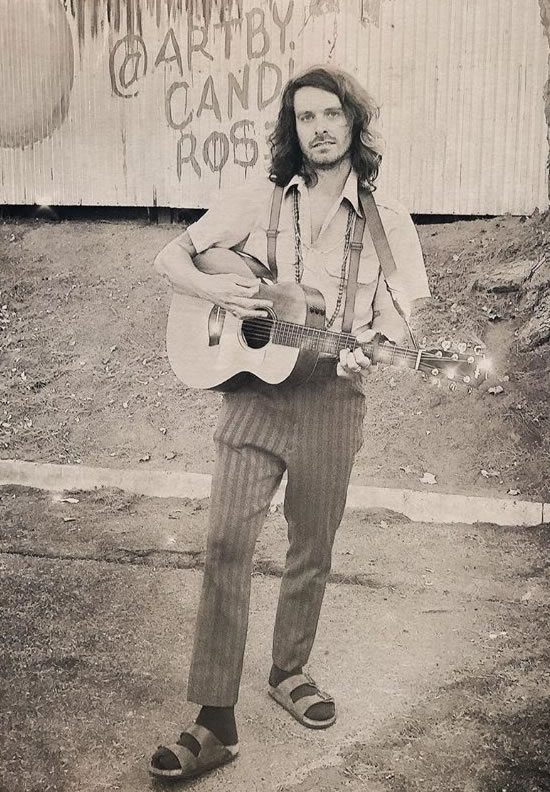
“I feel so inspired all the time; I can play better; I don’t get worn out as easy,” he said. “At first, I was like, ‘How am I gonna play music and not get high or drink a beer during the show? This is outrageous!’ Now, I couldn’t imagine playing a show drunk, and I used to do it every night! There’s just no way I could do that, and I used to do it every night.”
Touring as a modestly successful independent rock band is still hard work, but playing three sets in a single night is something Arnold never could have imagined himself pulling off a few years ago, when his brain was consumed with where his next hit or drink would be coming from. He doesn’t hit meetings like he once did, but he still applies the principles he picked up in treatment and in the rooms, and meetings are the first place he sends anyone who comes to him seeking advice on what to do about an alcohol or drug problem, he said.
“I definitely learned so much out of the rooms, and I’m so grateful for that, but I’ve learned there are other ways you can work on yourself, too,” he said. “I read a lot, and I eat well, and I try to sleep normally. I stopped eating meat and dairy and started doing the vegan thing, I try to drink a gallon of water a day, and I meditate once a day.
“I knew about meditation before, but I didn’t know how beneficial it is and crucial for someone in recovery, so I try to utilize that. And talking to people is good, along with reading about recovery. I’m interested in the whole process, and I’ll tell anybody having problems to go to treatment, because it saved my life. It’s the greatest decision I ever made.
“At the time, I thought, ‘This sucks! Why am I here?’” he added. “But when I look back, it saved my life, and I’m so grateful.”
Check Out These Other Artists' Stories

